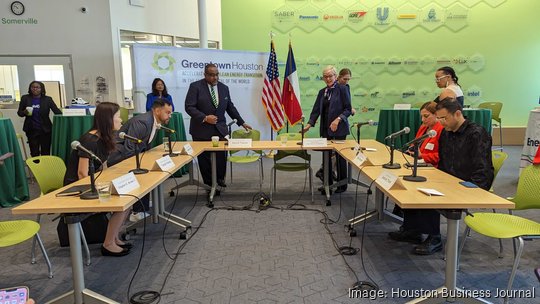
Houston companies and organizations focusing on climate tech and energy transition want the Department of Energy to provide more clarity on how they can reach federal funding and see federal involvement in their technologies, business leaders said at a March 9 roundtable
The roundtable, which was hosted by climate tech incubator Greentown Labs, featured Energy Secretary Jennifer Granholm and several minority business leaders. Several startups at various levels of funding and commercialization were present.
Granholm highlighted some of the climate and energy transition accomplishments of President Joe Biden’s administration, including the passage of the Inflation Reduction Act in August 2022. The bill allocated $370 billion in funding for climate technology innovation in the form of grants and tax credits, which Granholm said could be stacked using additional incentives for relocating to underserved communities.
“Depending on where you locate, you can get up to 70% in tax credits,” Granholm said. “It would be irresponsible not to take that.”
Stephen Brown, founder of the Clean Energy Fund of Texas Inc., asked Granholm if the DOE would take green banks into account. The Clean Energy Fund invests in clean energy and water conservation projects and helps people burdened by energy costs access clean energy resources, according to Brown.
“How can we partner with the DOE to facilitate the deployment of our resources and identify new markets in a way that’s sustainable?” Brown asked.
Brown also asked what the DOE was doing to ensure its resources are getting out to minority business leaders, a concern echoed by several speakers.
Granholm said the Inflation Reduction Act had provisions relating to clean energy retrofits for residential homes — an area that the Clean Energy Fund focuses on — meaning there was potential for a partnership to educate people who would benefit from those resources.
Other founders wanted to see more time for smaller businesses competing with larger energy and clean tech giants. Gordon Dash, founder of clean power startup Dash Clean Energy, shared his experience competing for Department of Energy grants.
“We apply for government technology, we go toe-to-toe with Fortune 500 companies, and I think (it's) a missed opportunity to not reward a small business,” Dash said.
Meanwhile, Houston-based Cemvita Factory co-founder Tara Karimi asked about biomanufacturing grants. Cemvita is researching the use of microbes for multiple clean fuel applications, including the production of clean hydrogen.
“We are at the stage of commercialization, and we want to talk about carbon dioxide utilization,” Karimi said. “We can do it, but it would take a minute. We think because of the [need for] climate tech, we should be able to synergize with the DOE to accelerate development.”
Granholm said the Department of Energy plans to release information about pathways to commercialization through a series of reports, which will compile findings on barriers companies face when scaling products and services to the commercial level. The first reports will focus on clean hydrogen and nuclear power, according to the Pathways To Commercial Liftoff program’s website.
Recent clean power developments in Houston include Syzygy Plasmonics signing a pilot test agreement in January to demonstrate its decarbonization reactor platform at North Carolina’s Research Triangle Park. Like Cemvita, Syzygy has received significant funding and is in the process of commercially scaling its product.
Separately, several energy companies, including oil and gas giants Exxon Mobil Corp. (NYSE: XOM), Chevron Corp. (NYSE: CVX) and Shell PLC (NYSE: SHEL), have joined a local initiative in support of a clean hydrogen hub on the Gulf Coast, which could benefit from $8 billion in funds offered by the DOE.
Also, Amazon founder Jeff Bezos committed $12 million from the Bezos Earth Fund to the Houston Energy Transition Initiative for a two-year project aimed at decarbonizing heavy industry and clean transportation across the Houston region and the Texas Gulf Coast.
To help bridge the gap for minority entrepreneurs looking to break into the climate tech space, Greentown Labs partnered with Boston nonprofit Browning the Green Space to launch the accelerator program Advancing Climatetech and Clean Energy Leaders, or ACCEL. The program named its first cohort in February, with two Houston companies — DrinKicks and Frakktal — making the cut.





